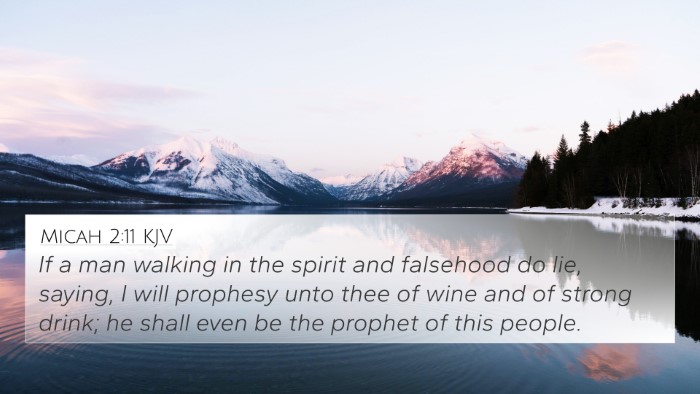Understanding Jeremiah 23:31
Jeremiah 23:31 states: "Behold, I am against the prophets, saith the Lord, that use their tongues, and say, He saith."
Verse Summary
This verse expresses God’s condemnation of false prophets who speak presumptuously in His name. The focus is on the gravity of misrepresenting God and the serious consequences of leading people astray through deceitful words.
Commentary Insights
-
Matthew Henry: Henry emphasizes that such false prophets exploit their position without true authority from God. He highlights that their use of "He saith" demonstrates a lack of accountability and a breach of divine truth.
-
Albert Barnes: Barnes indicates that God’s opposition to these prophets is a call to recognize their deception. He suggests that prophetic responsibility is sacred and should not be taken lightly. Their words may sound convincing, but they lack divine backing.
-
Adam Clarke: Clarke focuses on the consequences of speaking without divine inspiration. He points out that these prophets will incur serious judgment for misrepresenting God's will, reinforcing the importance of integrity in spiritual leadership.
Thematic Bible Verse Connections
To understand Jeremiah 23:31 deeply, it is helpful to consider its connections with other scriptural texts. Here are some significant verses that relate to the themes of false prophecy and divine authority:
- Deuteronomy 18:20 - This verse establishes the consequences for prophets who speak falsely in God's name: "But the prophet, which shall presume to speak a word in my name, which I have not commanded him to speak, or that shall speak in the name of other gods, even that prophet shall die."
- Ezekiel 13:3 - It continues the theme of false prophets: "Thus saith the Lord God; Woe unto the foolish prophets, that follow their own spirit, and have seen nothing!"
- Matthew 7:15 - Jesus warns against false prophets: "Beware of false prophets, which come to you in sheep's clothing, but inwardly they are ravening wolves."
- 2 Peter 2:1 - Peter speaks on the rise of false teachers: "But there were false prophets also among the people, even as there shall be false teachers among you."
- 1 John 4:1 - This verse encourages the testing of spirits: "Beloved, believe not every spirit, but try the spirits whether they are of God: because many false prophets are gone out into the world."
- Jeremiah 14:14 - God tells Jeremiah of the false visions: "Then the Lord said unto me, The prophets prophesy lies in my name: I sent them not, neither have I commanded them, neither spake unto them: they prophesy unto you a false vision and divination."
- Revelation 22:15 - A warning against those who practice falsehood: "For without are dogs, and sorcerers, and whoremongers, and murderers, and idolaters, and whosoever loveth and maketh a lie."
Cross-Referencing Biblical Texts
The idea of cross-referencing biblical texts can enrich one’s understanding of Jeremiah 23:31. Engaging in comparative Bible verse analysis encourages believers to draw connections and deeper insights from various scriptures. Here are a few tools and methods that facilitate cross-referencing:
- Bible Concordance: This tool helps in locating specific verses and words throughout the Bible, aiding in thematic studies.
- Bible Cross-Reference Guide: It provides references to related verses, which allows for a comprehensive understanding of themes.
- Cross-Reference Bible Study: Participating in group studies focused on cross-referencing can deepen faith and understanding.
- How to Use Bible Cross-References: Learning how to effectively utilize cross-references can enhance personal study and interpretation.
Conclusion
Jeremiah 23:31 serves as a crucial reminder of the importance of speaking truthfully in the name of God. By cross-referencing with other pivotal scriptures, one can glean a fuller understanding of the dangers posed by false prophets and the call to uphold God’s truth.








